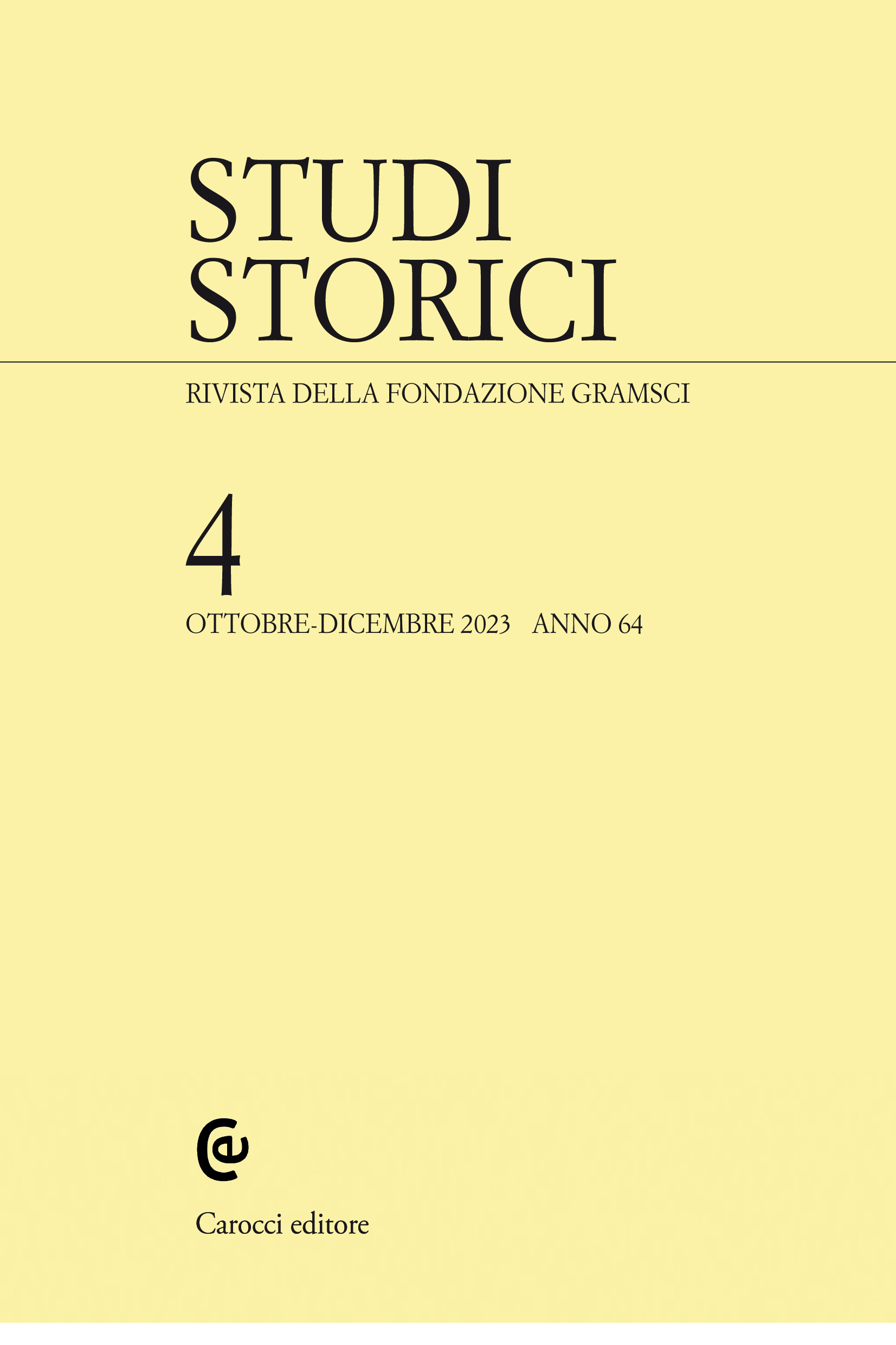
ottobre - dicembre 2023 anno 64
Sommario e abstract degli articoli
Gio Maria Tessarolo, pp. 781-812
Fra tradizione e mito. Limiti e prospettive del paradigma repubblicano
Between Tradition and Myth. Limits and Prospects of the Republican Paradigm
The existence of a «republican tradition» in the history of Western political thought has become a historiographic dogma, thanks especially to the work of the so-called Cambridge School. This article provides a critique. First, it shows that the insistence on the tradition’s distinctiveness was the product not just of historical research, but of various polemics against liberalism conducted between the 1970s and 1990s. Second, it considers the ways in which a tradition can be conceptualized in the history of thought, and compares them to the main versions of Cambridge-inspired republican historiography. The conclusion will be that, while in some ways it can be acceptable to speak of a republican tradition, the most common ones are methodologically inappropriate and historically misleading.
Keywords: Republicanism, Cambridge School, Contextualism, Quentin Skinner, John Pocock.
Parole chiave: Repubblicanesimo, Scuola di Cambridge, Contestualismo, Quentin Skinner, John Pocock.
Ricerche
Jacopo Paganelli, pp. 813-838
Il catasto del legato apostolico e il primo catasto fiorentino. Note sulla missione di Giovanni Vitelleschi in Tuscia (1427)
The Land Registry of the Apostolic Legate and the First Florentine Land Registry. Notes on the Mission of Giovanni Vitelleschi in Tuscia (1427)
The essay deals with the action of the papal representative sent to Florence by Martin V in the late 1420s. It attempts to cross-reference the compilation of the first Florentine Catasto (also extended to churches) with the preparation of a coeval – though never completed – papal census of the res ecclesiarum; at the same time, the analysis attempts to examine the effects of this operation on the clergy of the Florentine dominion.
Keywords: First florentine Catasto, Taxation of churches, Martino V.
Parole chiave: Primo catasto fiorentino, Tassazione delle chiese, Martin V.
Massimo Asta, pp. 839-860
Fascismo e pratiche carcerarie della censura sui detenuti politici
Fascism and Prison Practices of Censorship of Political Prisoners
According to Michel Foucault, censorship and reading control in prison, as acts of breaking communication between the prisoner and the outside world, have been essential features of the functioning of the carceral regime ever since the modern prison was created and spatially built as a place of separation from the rest of society. This article aims to revise the historical operability of Foucault’s paradigm by investigating the specificity of the practices adopted during fascism to control the epistolary writing and reading of political prisoners. The study of the letters seized by prison directors and of the more traditional sources, such as the correspondence between prison and ministerial bodies, as well as memoirs, corroborates the thesis of the totalitarian matrix of fascist prison politics, but also reveals the gap between the regime’s propaganda and reality.
Keywords: Prison, Correspondence, Fascism, Censorship, Antifascism.
Parole chiave: Carcere, Corrispondenza, Fascismo, Censura, Antifascismo.
Daniel Goldstein, pp. 861-892
Alleanza internazionale «Giuseppe Garibaldi» per la libertà d’Italia (Mexico City, 1941-1945): Popular Front or Soviet Puppet Organization?
During the Second World War, the most prominent Italian antifascist organizations in the Americas refused to admit communists. This is not surprising, given the need to secure the cooperation of the US government. The Alleanza Garibaldi, however, sought to build a broader alliance. By admitting all antifascists, no matter their political affiliations, the Garibaldi attempted to promote unity as a sine qua non for defeating nazi-fascism. Based in Mexico City, then a hub for left-wing political exile, the Alleanza leveraged the resources of a variety of transnational partners to disseminate propaganda, assist refugees, and lobby for Italian interests. This article intends to reconstruct the history of this little-known organization and to examine the ways in which these complex solidarity networks both helped and hindered the group’s unity agenda.
Keywords: Antifascism, Exile studies, Mexico, Communism.
Parole chiave: Antifascismo, Studi sull’esilio, Messico, Comunismo.
Duccio Basosi, Benedetto Zaccaria, pp. 893-916
Neoliberisti contro. Ronald Reagan, la crisi dei debiti esteri e l’opposizione repubblicana al Fondo monetario internazionale, 1981-1983
Neoliberals vs. Neoliberals. Ronald Reagan, the International Debt Crisis, and the Republican Opposition to the International Monetary Fund, 1981-83
At the outbreak of the “international debt crisis” in 1982, the Reagan administration reacted by preparing a “strategy” that gave the IMF a central role in trying to prevent a chain of sovereign defaults which may have endangered big banks in the US and beyond. While most scholars have observed that Reagan’s policy was aimed at facilitating a “neoliberal” turn in indebted countries, in the US the Reagan plan enraged a conservative front that interpreted it as a betrayal of laissez faire and, ultimately, of Reaganism itself. This essay examines the bitter battle that Reagan waged to have Congress and his own Republican Party accept his administration’s approach. The story shows how the Reagan response to the debt crisis came about as an attempt, in some ways improvised and pragmatic, to reach an uneasy synthesis between the administration’s idealistic predilections for the “minimal State” and its need to rescue the U.S. (and international) banks.
Keywords: Ronald Reagan, Sovereign debt crisis, Neoliberalism, Washington Consensus, International Monetary Fund.
Parole chiave: I Ronald Reagan, Crisi del debito sovrano, Neoliberalismo, Washington Consensus, Fondo monetario internazionale.
Opinioni e Dibattiti
Michele Napolitano, pp. 917-947
Rileggendo I purosangue di Giorgio Pasquali
Rereading I purosangue by Giorgio Pasquali
This article attempts to reconsider a famous essay by Giorgio Pasquali, I purosangue (autumn 1933), acknowledging on the one hand the goodness of Pasquali’s rejection of the aberrations of the Rassenkunde, but relativising its implications with regard to the contemporary Italian scene, with which Pasquali’s essay proves to be fundamentally in line.
Keywords: I purosangue, Giorgio Pasquali, Racial theories, Fascist Italy.
Parole chiave: I purosangue, Giorgio Pasquali, Teorie razziali, Italia fascista.
Note critiche
Giuseppe Trebbi, pp. 949-969
Giovan Battista Ramusio tra politica, religione e cultura
Giovanni Battista Ramusio between Politics, Religion and Culture
This article reflects on the book by Fiona Lejosne, Écrire le monde depuis Venise au XVIe siècle. Giovanni Battista Ramusio et les Navigationi et viaggi, Genève, Droz, 2021 («Cahiers d’Humanisme et Renaissance», 174).
Keywords: Geographical discoveries, Renaissance, Republic of Venice, Venetian chancellery, religious crisis of the 16th century.
Parole chiave: Scoperte geografiche, Rinascimento, Repubblica di Venezia, Cancelleria veneziana, Crisi religiosa del Cinquecento.
Emanuele Colombo, Niccolò Guasti, pp. 971-993
L’opulenza del Brasile coloniale
The Opulence of Colonial Brazil
This article reflects on the book by Matteo Giuli L’opulenza del Brasile coloniale. Storia di un trattato di economia e del gesuita Antonil, Roma, Carocci, 2021.
Keywords: Jesuits, Slavery, Economics, America, Colonial Brazil.
Parole chiave: Gesuiti, Schiavitù, Economia, America, Brasile coloniale.
Michele Battini, pp. 995-1007
Le fragili fondamenta della politica moderna
The Fragile Foundations of Modern Politics
This article reflects on the book by Raffaele Romanelli, Nelle mani del popolo. Le fragili fondamenta della politica moderna, Roma, Donzelli, 2021.
Keywords: Aporias of the modern political democracy, Rethorics of reaction.
Parole chiave: Aporie della democrazia politica moderna, Retoriche della reazione.
Sfoglia gli altri numeri dell’anno 64 / 2023
Elenco dei fascicoli pubblicati dal 2010
Seleziona fascicolo...
- anno 65 / 2024
- 1
- 2
- anno 64 / 2023
- 1
- 2
- 3
- 4
- anno 63 / 2022
- 1
- 2
- 3
- 4
- anno 62 / 2021
- 1
- 2
- 3
- 4
- anno 61 / 2020
- 1
- 2
- 3
- 4
- anno 60 / 2019
- 1
- 2
- 3
- 4
- anno 59 / 2018
- 1
- 2
- 3
- 4
- anno 58 / 2017
- 1
- 2
- 3
- 4
- anno 57 / 2016
- 1
- 2
- 3
- 4
- anno 56 / 2015
- 1
- 2
- 3
- 4
- anno 55 / 2014
- 1
- 2
- 3
- 4
- anno 54 / 2013
- 1
- 2
- 3
- 4
- anno 53 / 2012
- 1
- 2
- 3
- 4
- anno 52 / 2011
- 1
- 2
- 3
- 4
- anno 51 / 2010
- 1
- 2
- 3
- 4
